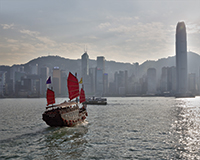 Hong Kong is perhaps the only city in the world where people seem to talk about property more than London.
Hong Kong is perhaps the only city in the world where people seem to talk about property more than London.
The luscious mountains that, away from the skyscrapers, dominate the skyline, act as a pressure cooker, constraining supply at the same time as making Hong Kong such an attractive place to live.
That pressure was partly to blame for the eruption of public anger which arrived in the form of the Occupy protests last year.
Resentment over mainland purchasers pushing up the island’s resi prices to even more unaffordable levels helped fuel the fire sparked by Hong Kong chief executive CY Leung, after he revealed Beijing would have the final say on which candidates could stand for election.
The protests have since dissipated to a handful of placards on show under some of the city’s bypasses. But housing remains close to the top of the agenda for Leung – perhaps unsurprising, given his property background.
What was less expected was the vitriol many in the city’s property market reserve for the former JLL and DTZ executive when talking behind closed doors.
Elected on a tide of anti-tycoon rhetoric, Leung has managed to anger big developers at the same time as failing to solve the city’s intractable housing crisis.
Nor do his policies appear to be having much discernible impact on the tycoons, with the handful of families that have long dominated Hong Kong’s property market seemingly going from strength to strength.
The government has been successful in delivering new infrastructure that helps to unlock more sites in the new territories, which will soon be well-connected to the city centre, relieving some of the pressure on the housing market.
But the ongoing sheds-to-resi policy has delivered limited results – with as many developers arguably abusing the system as there are those actually building houses.
And the stamp duty reforms introduced last year which placed punitive rates on overseas purchasers – likely being examined by some UK political parties in the run up to the general election – have been even more questionable. While transactions fell sharply, the intended impact on pricing has not materialised and cynics would argue the market is simply less functional now.
The impact of all that rhetoric is increasingly clear.
The decision by Hong Kong’s richest man, Li Ka-shing, to restructure his business empire earlier this year – moving its registration offshore and following it up with a string of audacious deals in the UK and US – underlines the lack of confidence some now have in the region’s growth prospects.
Western markets are now seen as offering better returns than the slowing Chinese economy.
The significance of Hutchison Whampoa and Cheung Kong being moved offshore is debatable, but Li’s influence on other titans of Asian industry is not.
His push overseas has been a long time coming and it will almost certainly be followed by many of the island’s other wealthiest families.
But while London will surely enjoy a short-term gain, it would do well to watch how Hong Kong deals with its acute growing pains. Because many of the same problems Hong Kong’s success has brought are plaguing politicians here, too.
jack.sidders@estatesgazette.com










